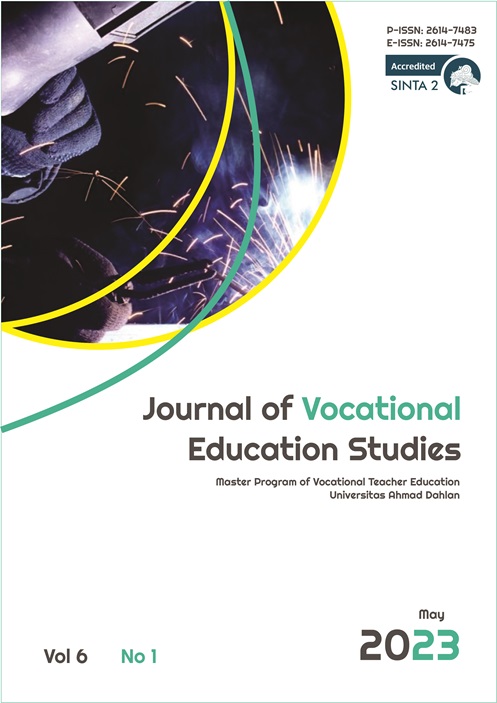The Influence of Competence in Utilizing Learning Media, Managing Class, and Diagnosis of Students' Learning Difficulties on Teaching Performance of Visual Communication Design Teachers of Vocational Schools in Yogyakarta
DOI:
https://doi.org/10.12928/joves.v6i1.7631Keywords:
Teacher Competence, Learning Media, Classroom Management, Learning Difficulties, Teacher Teaching PerformanceAbstract
This study aims to analyze the influence; teacher competence in utilizing instructional media, teacher competence in managing classes, teacher competence in diagnosing student learning difficulties and analyzing the influence of teacher competence simultaneously on teaching performance of Visual Communication Design teachers at vocational school (SMK) in Yogyakarta, namely at SMK Negeri 3 Kasihan Bantul, SMK Negeri 5 Yogyakarta , SMK Negeri 2 Sewon Bantul, SMK Koperasi Yogyakarta and SMK Muhammadiyah 2 Yogyakarta. Research using quantitative methods. The technique of collecting data is done by questionnaire. Data processing analysis by means of validity test, reliability test. Statistical prerequisite tests were carried out through the normality test, linearity test, multicollinearity test and heteroscedasticity test. Data analysis was carried out through correlation tests, coefficient of determination tests and F tests. The results showed that; 1) there are positive and significant effects of all the variables teacher competence: in utilizing instructional media, in managing the class, and in diagnosing student learning difficulties on teachers teaching performance of Visual Communication Design teachers at vocational school (SMK) in Yogyakarta. It is hoped that teachers will always be able to develop themselves, maintain and improve their teaching performance by increasing their competence.
References
Akbar, M. (2020, 26 November). The role of the teacher in the advancement of Indonesian education. www.tokohkita.co https://www.tokohkita.co/read/20201126/1727/peran-guru-dalam-kemajuan-pendidikan-indonesia.
Djamarah, S.B. & Zain, A. (2013). Teaching and learning strategy. Jakarta: Rineka Cipta.
Haryono, Siswoyo. (2020). The effect of principal leadership and teacher competence on teacher performance: the role of work motivation. International Journal of Business Marketing and Management (IJBMM), 5 (4), 09-14. ISSN: 2456-4559.
Hamalik, O. (2004). Educational psychology. Bandung: Sinar Baru Algesindo.
Mulyadi, M. (2010). Diagnosis of learning difficulties and guidance on special learning difficulties. Yogyakarta: Nuha Litera, 2010.
Mulyana, A. (2021). The effect of classroom management and teaching skills on teacher performance at SMK Negeri 3 Karawang Regency. JPD: Pedagogiana – Journal of Basic Education, 9(8), 199-209. https://doi.org/10.47601/ajp.83.
Mulyasa. (2006). Competency-based curriculum: concepts, characteristics, implementation, and innovation. Bandung: Remaja Rosdakarya.
Nazarotin, S. (2022, 22 Februari). Will the quality of Indonesian education increase with the presence of the 2022 curriculum?. www.kompasiana.com https://www.kompasiana.com/iqrima20712/62142ae0bb4486475d33ff02/akankah-mutu-pendidikan-indonesia-meningkat-dengan-hadirnya-kurikulum-2022.
Regulation of the Minister of Education and Culture of the Republic of Indonesia number 16 of 2007 concerning academic qualification standards and teacher competence (2007). https://peraturan.bpk.go.id/Home/Details/216104/permendikbud-no-16-tahun-2007.
Rosyada, D. (2016, 21 September). Professional teachers must have a good personality. www.dederosyada.lec.uinjkt.ac.id http://dederosyada.lec.uinjkt.ac.id/reviews/guruprofesionalharusmemilikikepribadianyangbaik,
Rusman (2016). Learning models: developing teacher professionalism. Jakarta: RajaGrafindo Persada.
Sardiman, A.M. (2011). Interaction and motivation to learn to teach. Jakarta: RajaGrafindo Persada.
Sulaiman, Jamilah. (2020). Teacher competence and 21st century ckills in transformation schools 2025 (TS25). Universal Journal of Educational Research, 8(8): 3536-3544. http://www.hrpub.org. DOI: 10.13189/ujer.2020.080829.
Sudrajat, Jajat. (2020). Kompetensi guru di masa pandemi covid-19. Jurnal Riset Ekonomi dan Bisnis, 13 (1): 100-110. http://journals.usm.ac.id/index.php/jreb.
Sugihartono, S. (2013). Educational psychology. Bandung: Alfabeta.
Syamsudin, A. (2004). Educational psychology module teaching system device. Bandung: Remaja Rosdakarya.
Yunus, S. (2020, 5 Mei). Portrait of Indonesian education, who has to improve?. www.kumparan.com https://kumparan.com/syarif-yunus/potret-pendidikan-indonesia-siapa-yang-harus-berbenah-1tKr0bDEZwG.
Downloads
Published
Issue
Section
License
Copyright (c) 2023 Universitas Ahmad Dahlan

This work is licensed under a Creative Commons Attribution-ShareAlike 4.0 International License.
Authors who publish with Journal of Vocational Education Studies (JOVES) agree to the following terms: Authors retain the copyright and grant the Universitas Ahmad Dahlan right of first publication with the work simultaneously licensed under a Creative Commons Attribution License (CC BY-SA 4.0) that allows others to share (copy and redistribute the material in any medium or format) and adapt (remix, transform, and build upon the material) the work for any purpose, even commercially with an acknowledgement of the work's authorship and initial publication in Universitas Ahmad Dahlan. Authors are able to enter into separate, additional contractual arrangements for the non-exclusive distribution of the journal's published version of the work (e.g., post it to an institutional repository or publish it in a book), with an acknowledgement of its initial publication in Universitas Ahmad Dahlan. Authors are permitted and encouraged to post their work online (e.g., in institutional repositories or on their website) prior to and during the submission process, as it can lead to productive exchanges, as well as earlier and greater citation of published work (See The Effect of Open Access).










.png)



